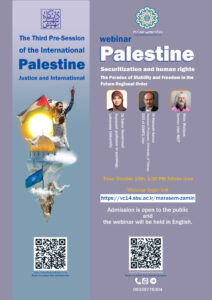Dr. Morteza Eshrafi /Expert on Russia, Central Asia and the Caucasus
The development in the concept of religion is one of the new developments in the field of international relations studies. In primary legislation, Religion has been used as a sanction. Religious has an important role in the social control in the ideas of some people like “Montesquieu”, “Hobbes” and Jean-body “. Maurice Barbier also believes that the explosive growth of the religious in political and social issues outside of Europe is the most important issues which show revival of religion in the present time. Also some believe that in present century there is a religious or it doesn’t exist anymore. If so, it must be linked with other social institutions and policies. This development in concept of religion and its role in the community, on their own have led this issue to the international relations and security studies. However in the later century it was discussed if the general hypothesis about the role of religion in modernity and secularism increased or not. But it is clear that in all civilizations and not only Islam, a supporting awareness has emerged a supporting awareness related to the religion and its role in the social life. In Muslim societies, religious awakening reflects the importance of the role of studying the religious in international relations. And religion as a kind of dialogue and tolerance has changes into a global phenomenon. So this phenomenon will be discussed in international security studies.in the sense that the religion globalization formation has a direct relation with the definition of security. In Europe, America and Australia the religious resistance has been explained in domestic and social issues. In the sense that religion as a social guidelines for political life became important in the confrontation with the challenges of reducing the role of religion and increasing the secularism which were the legacy of the Enlightenment.
The centrality of religion in the development of Central Asia:
Religion in the West is a sensitive program which some of the parties apply to controlling challenges and social order. If religion considered as a source of community and identity, it can be said that most religious conflicts in international politics are different. Most of secular countries attack the religious groups. In the sense that, threat to the religious groups in the name of religion against the government can be explained in the dialogue of terror. This attitude has tied the relation between religion and international security. Of course a treat so-called terrorist with religion and a responder called insult to the religious community had made have highlighted the religious involving in security. It should be said that terrorism is a potential enemy of International Relations, as religious radicalism who justify their acts of faith and expressing his belief. In other words in the discourse of religious radicalism, this dialogue is dominant that the number of them might be less but the religious is more important, dangerous and unpredictable. They are ready to be the victims of religious.
So religion in tree ways can cause concerns in international policy especially central Asia:
• Religious groups can be a threat to the survival of the Central Asian states.
• It seems that religious belief can be considered as a threat to non-religious activists or modern trends (countries, technology, industrialization, modernism,).
• Faith and belief may be a threat to discourse
Nowadays religion or the power of religion and even in detailed meaning the religious actors is the realities in the international system and policy. Powerful secularists in international relations pay attention to post-secular elements. So against the domination of religion supporters in international system that liberal and the Islamists represent them. Recent religious movement is forming.
Central Asia as the core of crises in the Islamic world:
It might be claimed that the common heritage of five Central Asian countries as a fully integrated part of the Soviet Union and in the shadow of its security, will help the formation of Central Asia as a regional security complex. However, securities series can be existed regardless of their involved actors recognize it or not. Also they may not value and realize all the concepts which are part of them.
In this regard, Central Asia includes dynamics, mental obsession and opportunities in the field of security policy. Although each country takes its own national policy which adopted on the basis of its own interests, security policies of Central Asian states are interrelated and interconnected. Accordingly, ‘Bai Buzan’ stated that a security complex is a group of countries which their basic security concerns are so intertwined in a way that their national security in a realistic look cannot be separated from each other.
Challenges facing the Islamic world in controlling the crises of Central Asia
The operation of existing crises in the Central Asia in its new concept needs cooperation among states rather than their confrontation. Based on a principle the protection of territorial and political survival of a country, ensuring the organic survival of people, creating the necessary conditions for economic welfare and coordination between tribal people in a country can be the aims of stabilization and be one of the approaches to control the crises. Since independence, Central Asia and the Caucasus states mainly faced with similar political, ethnic, identity and border issues and this factor faced political units with geopolitical problems. In this atmosphere with unsettlement in the security environment, most of the newly established states found providing their security purposes depended on continuing the close cooperation with the heir to the Soviet Union. Thus, they couldn’t create a defense-security policy independent from Russia for themselves. They first gave a special security role to Russia through bilateral treaties with the Russian Federation. Thus the Russian strategic influence in the region was paved. The Russian government also with the knowledge of security concerns of its neighbors tried to appear as the dominant state and the security ensuring and due to geographic location, long borders and common security issues, showed itself as the natural partner of Central Asia states. On the other hand, by making concern in the countries of the region about permeability of these republics borders against terrorist attacks and drug trafficking and instilling the necessity of providing security arrangements and signing the cross-border cooperation agreements, expand the activities of its border guards to the territory of the former Soviet Union and thwarted the threats to its territory. In this regard, Russia has created joint rapid reaction force to combat terrorism and have bases in Kyrgyzstan, Tajikistan and Armenia as well.
Therefore, the causes and reasons of the failure of Central Asian countries in controlling the existing crises in the region can be summarized in the following cases:
• Not fully independence of the Central Asian states
• On the other hand the absence of peaceful coexistence culture among regional leaders
So it can be said that controlling the crisis in the Central Asia region is an issue which is more than structures. Because stability and peace in this region are the issues involved in cooperation and interaction of central Asian states and its surrounding countries in Islamic world including Iran, Turkey, Saudi Arabia and, of course, Russia, China and America.
• At a glance to the crisis situation in Central Asia, it is understood that in such this situation, relations between Central Asian countries depend on superpowers decisions particularly Russia. In other world, it reminds “divide and rule”.
However, the Central Asian countries have established an union called ” Central Asia Regional Economic Cooperation (CAREC) in several regional and international organizations and associations, this organization doesn’t carried out anything towards political and economic integration of member countries and the economic and social situation of states, particularly Tajikistan and Kyrgyzstan is getting worse instead of improving.
Coming plans to control the crises in the Central Asia
The partnership for Peace is a program to control the exiting political-security crises which from the beginning aims to create necessary conditions for the west military presence in the region. Newly independent states which were very vulnerable could become familiar with U.S. and the West military organizations through participation in this program as well as getting the experience. In addition, the Partnership for Peace program could integrate countries of the region in security structure of west in its way and open new perspective on regional cooperation. Central Asian states by participating in this program, learned the necessary outlines of civil- military reforms to strengthen the process of democratization and domestic stability. However, America is willing to minimize its direct presence in countries affected by crises and just satisfy to the facilities for its direct presence in critical situations, Central Asia is not an exception.This new doctrine also reduces the huge expenses of world war on terrorism (U.S. paid 16 billion dollars only for using the Khanabad military base to Uzbekistan) and preserves the possibility of widespread presence of US troops at any moment and anywhere in the world. This doctrine allows specialists to pay their attention and resources to non-military projects such as public health, safe drinking water, building schools and training centers and reduce the military presence in local communities. In this way, the use of economic, political and intelligence means takes the place of purely military means. By implementing this strategy, native people will observe the positive effects of having relation with U.S. clearly and in the long term will change to the strong defenders of reform and democratic developments.
of course, the present of Islamic countries including Iran, Turkey and some Arabic countries as the powerful representatives of Islamic world which have strategic objectives in Central Asia could also help the process of controlling the crisis in the region in the framework of religious, cultural and economic programs with taking into the account the political patterns of the Central Asian countries.
**Disclaimer: The contents of this article are of sole responsibility of the author(s). The Institute For Islamic World Future Studies (IIWFS) will not be responsible for any inaccurate or incorrectstatement in this article. The source and the author’s copyright must be displayed. For publication of IIWFS articles in print or other forms including commercial internet sites, contact: editor@iiwfs.com





